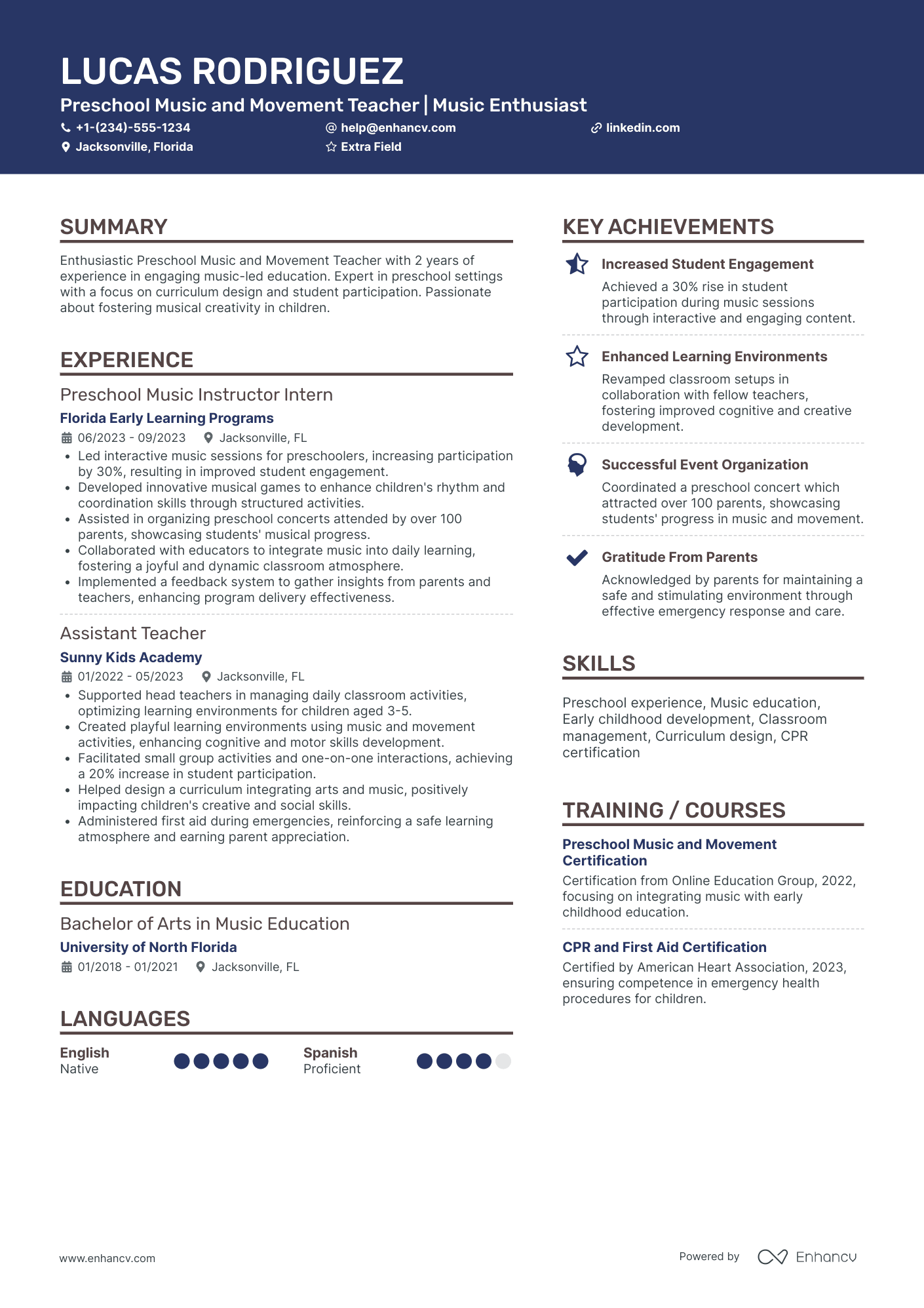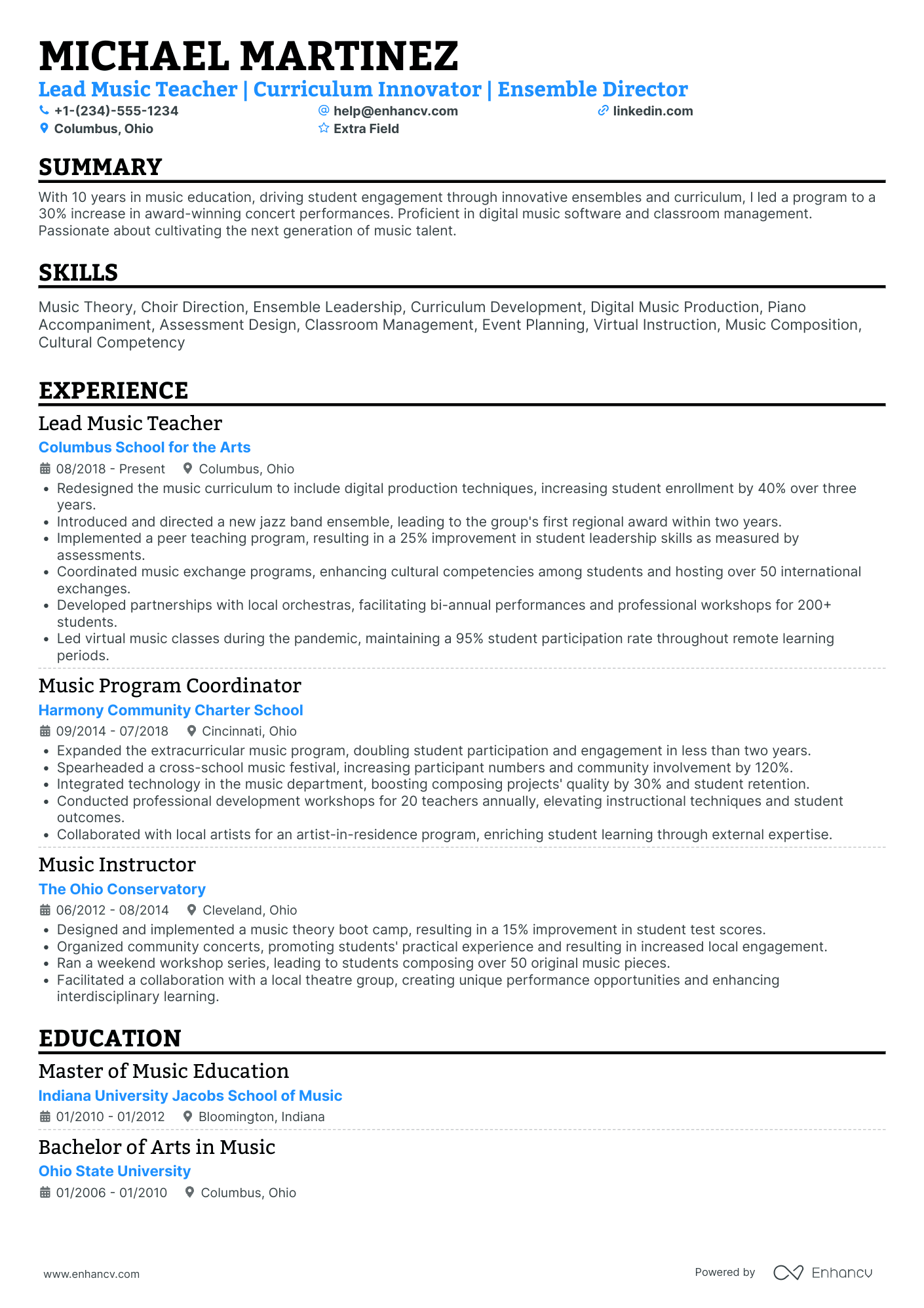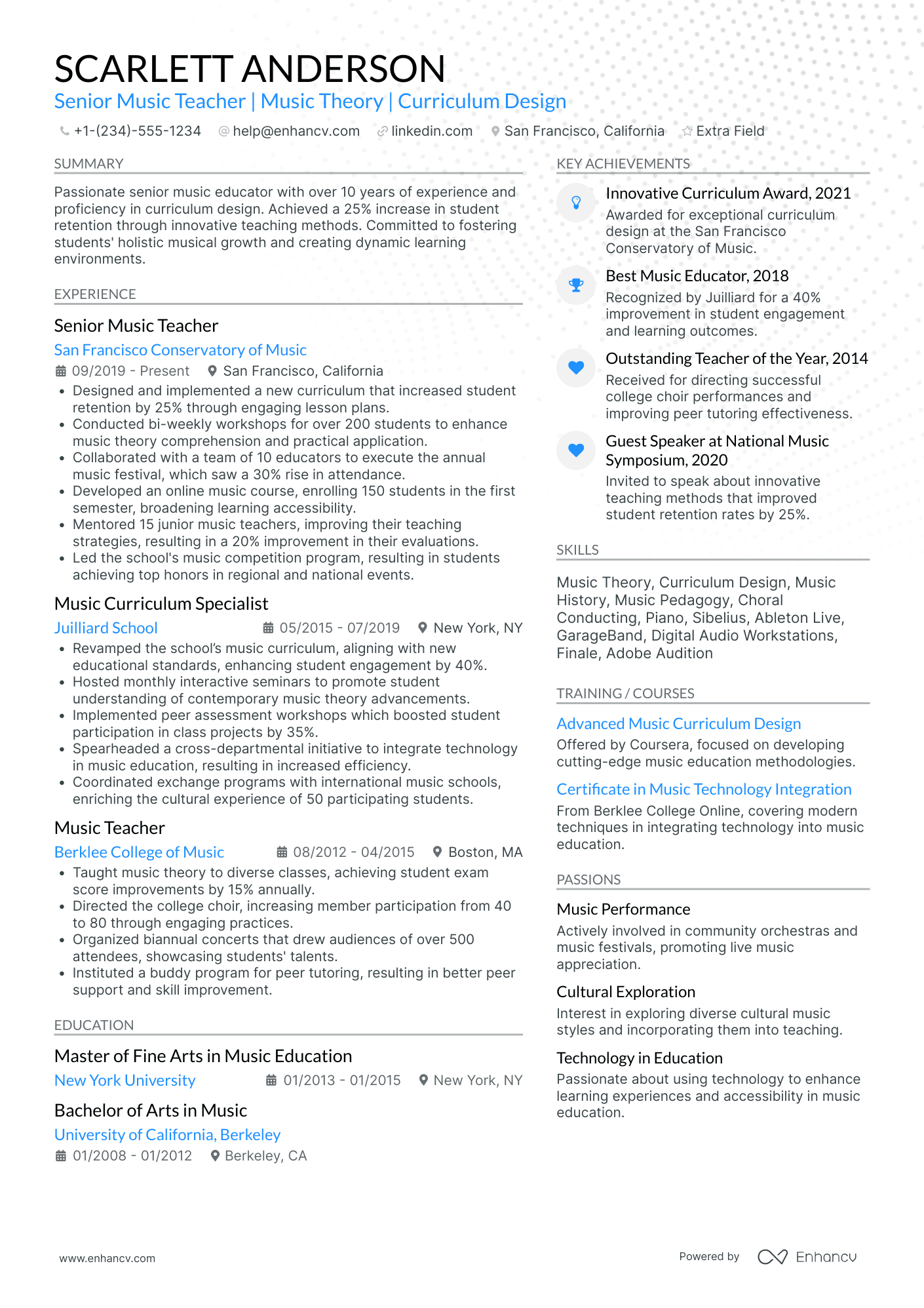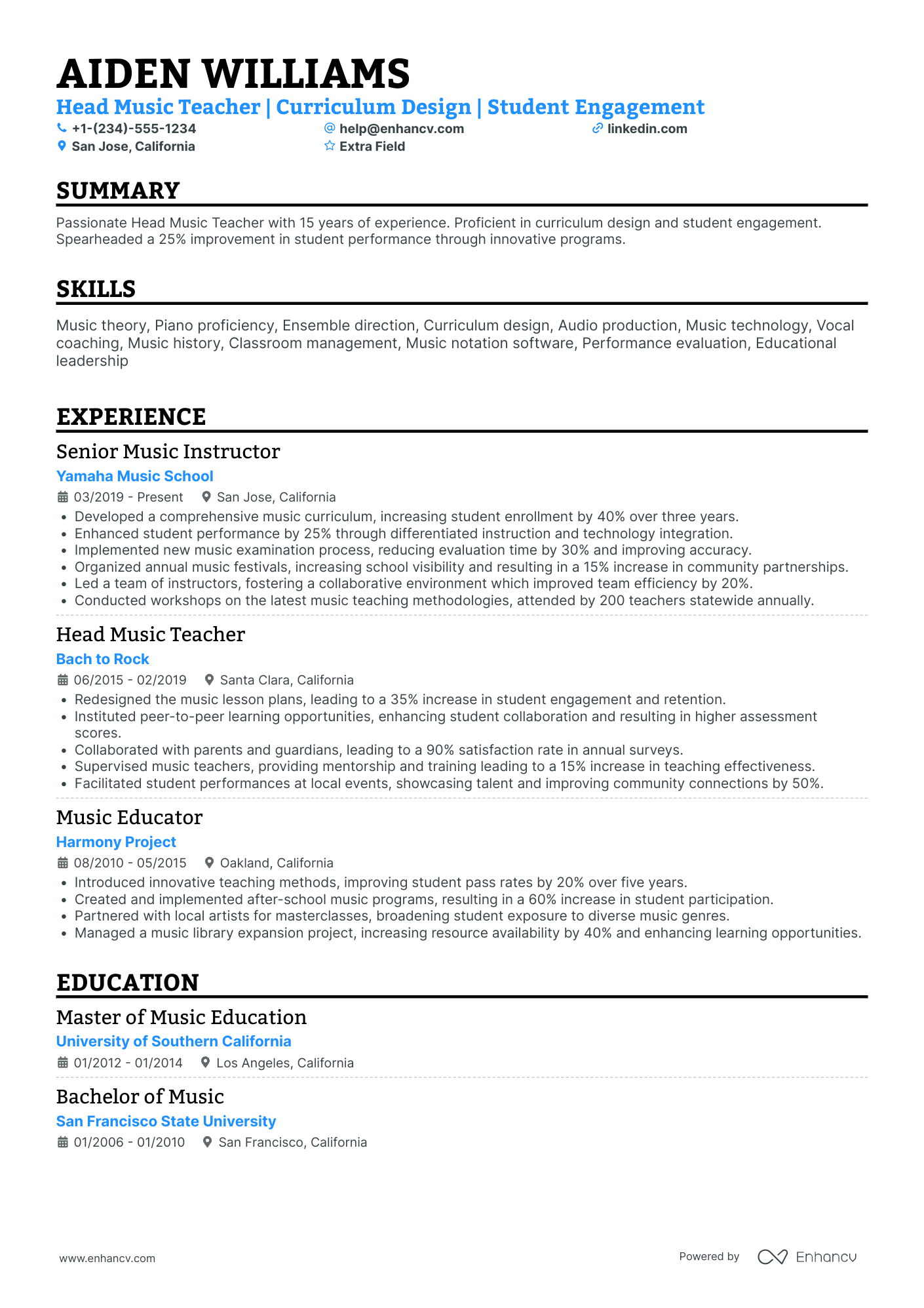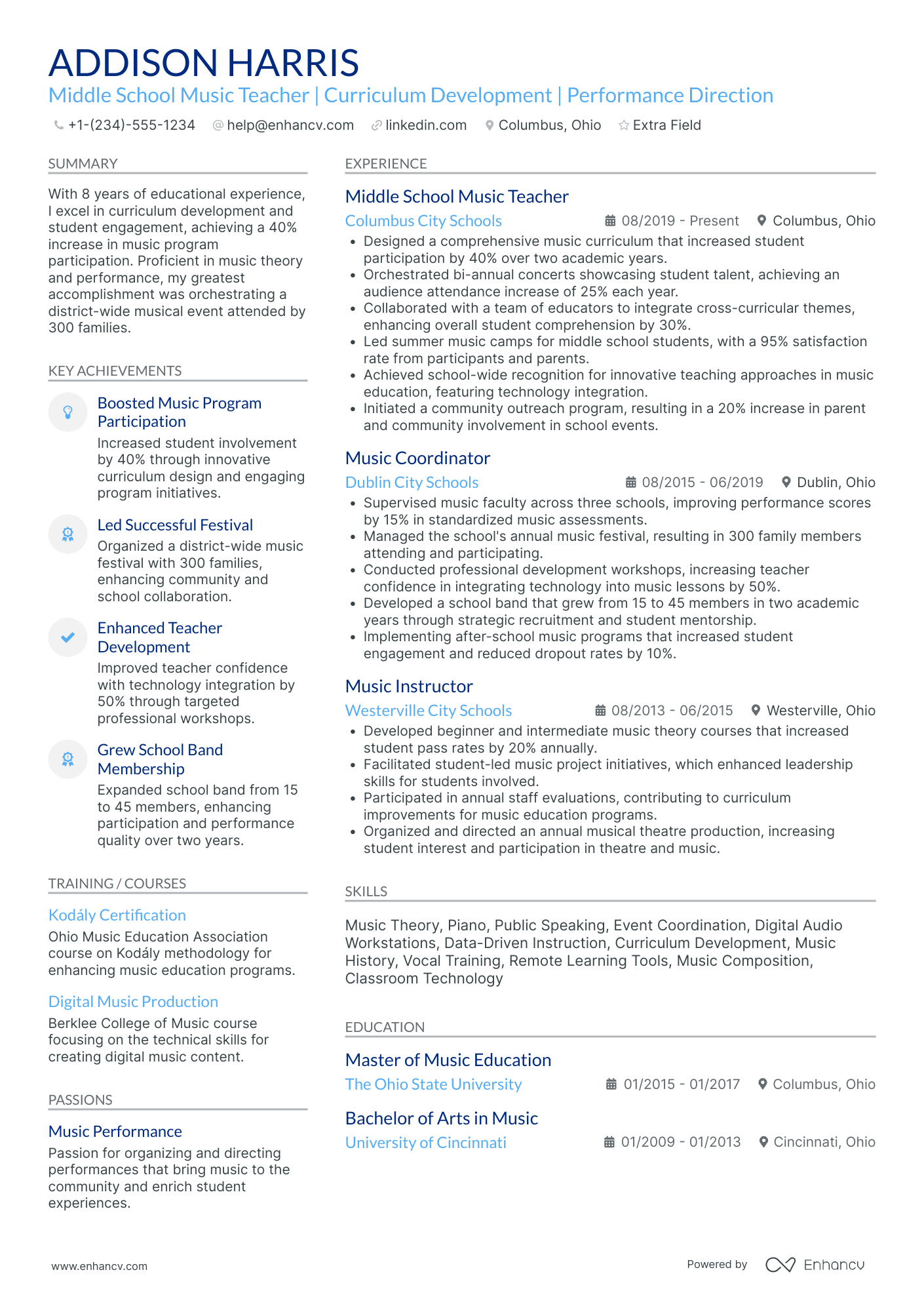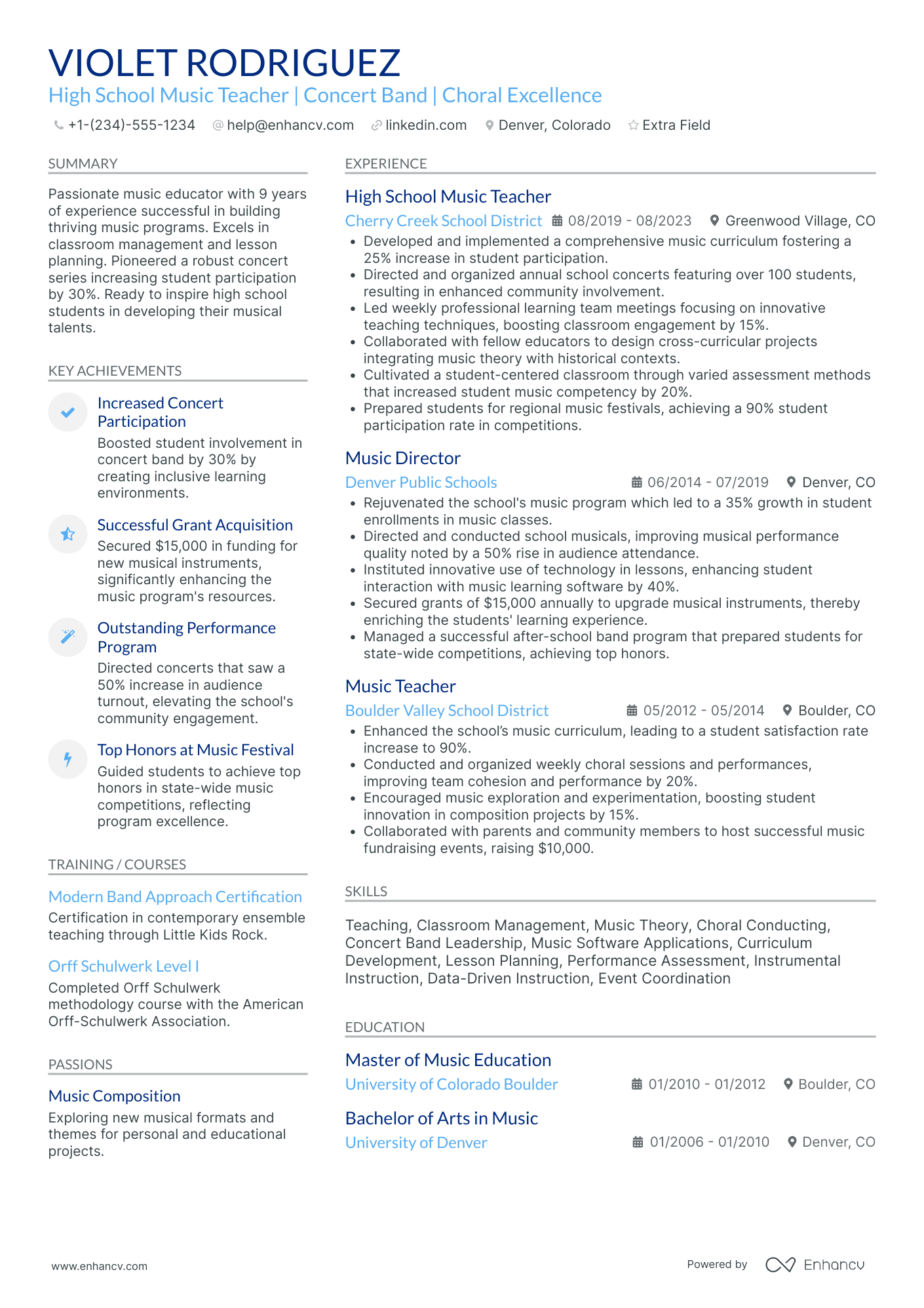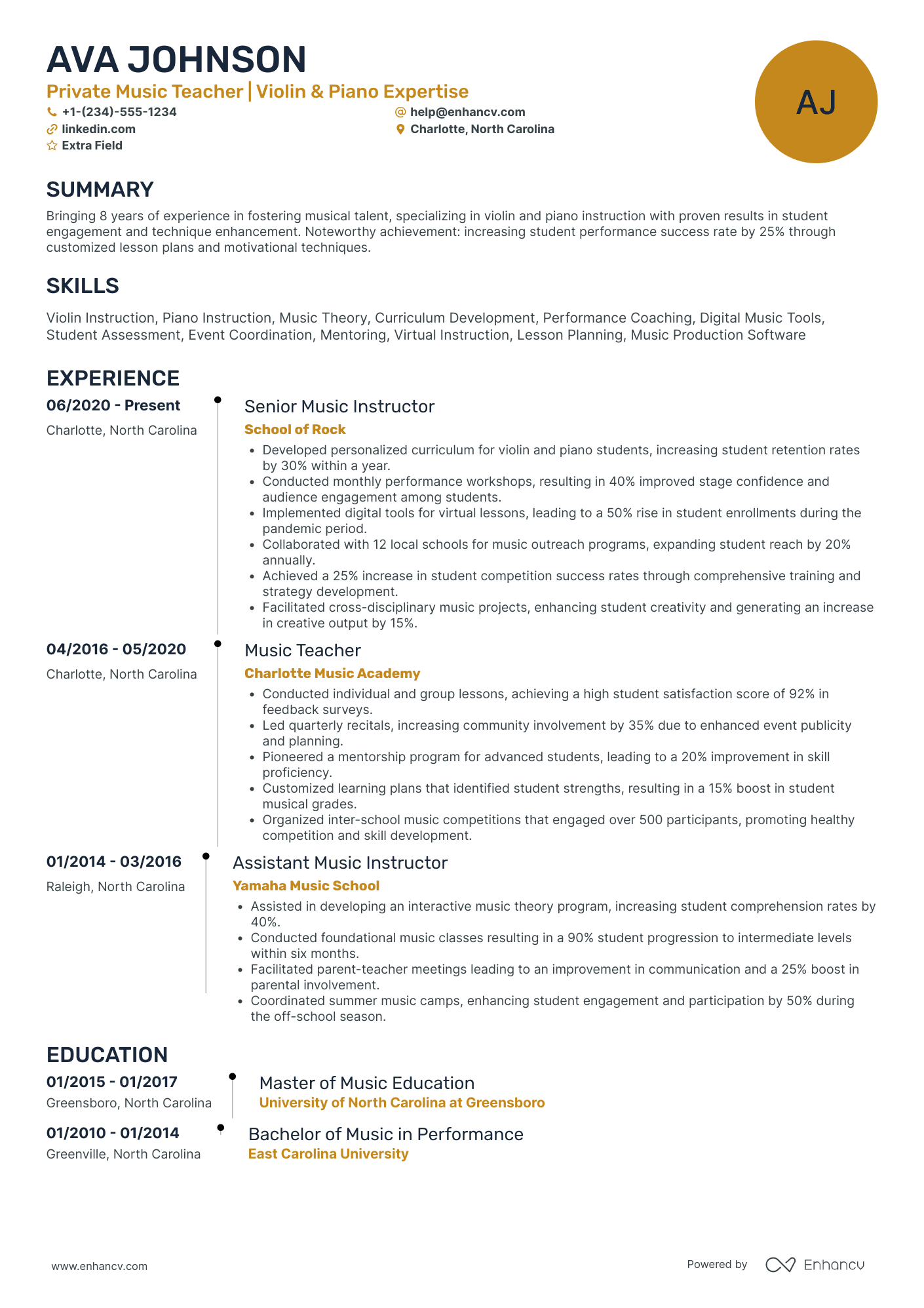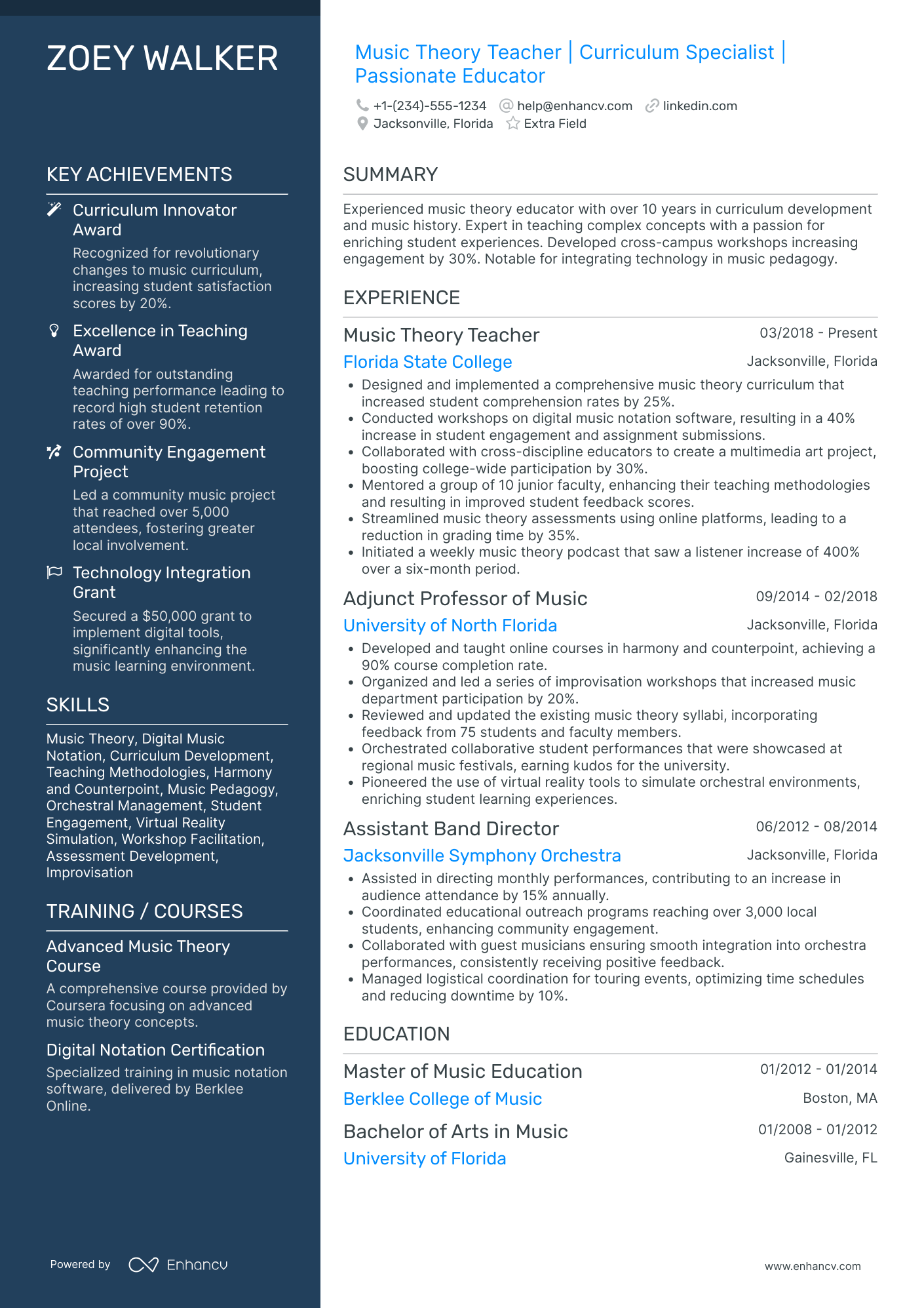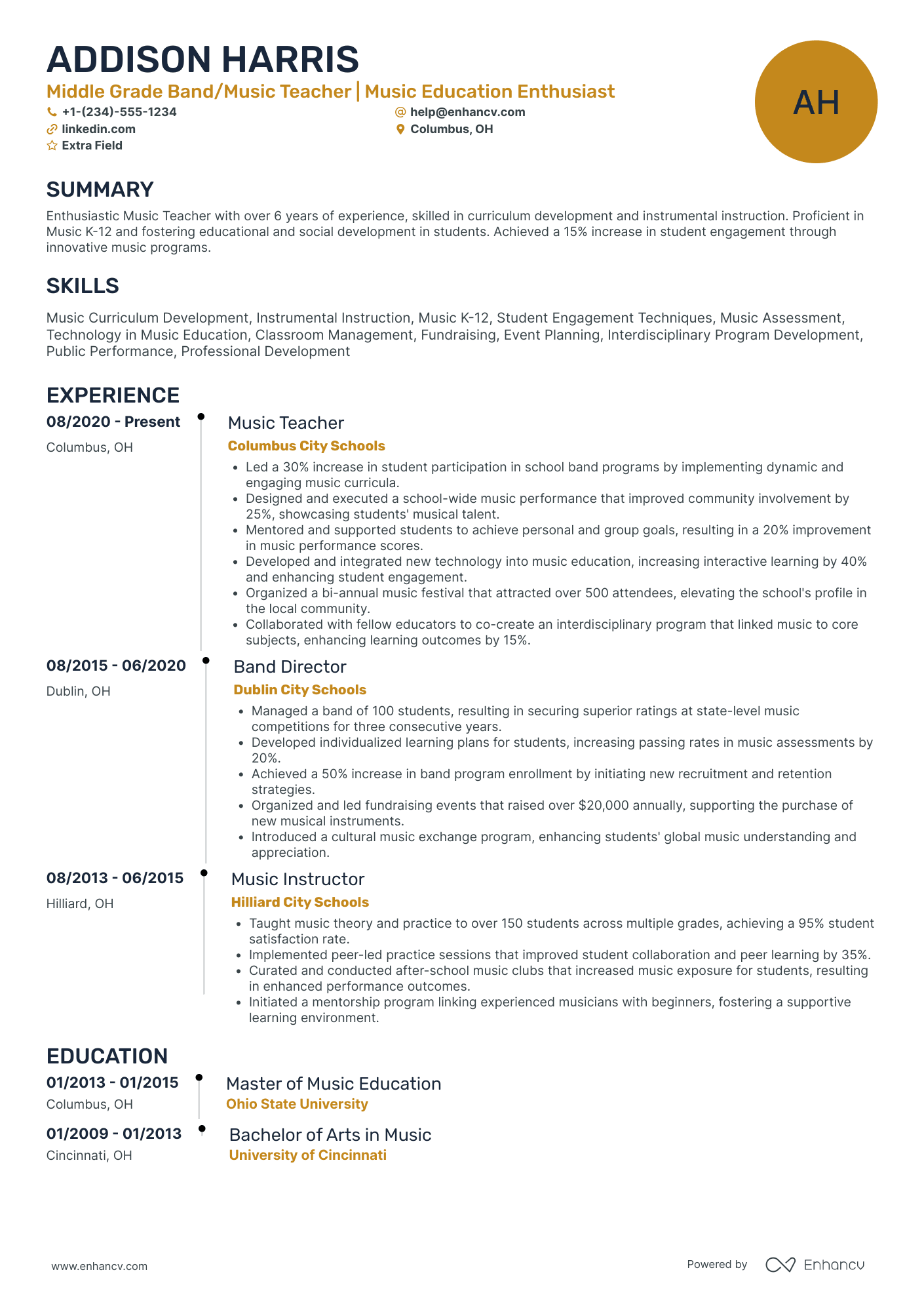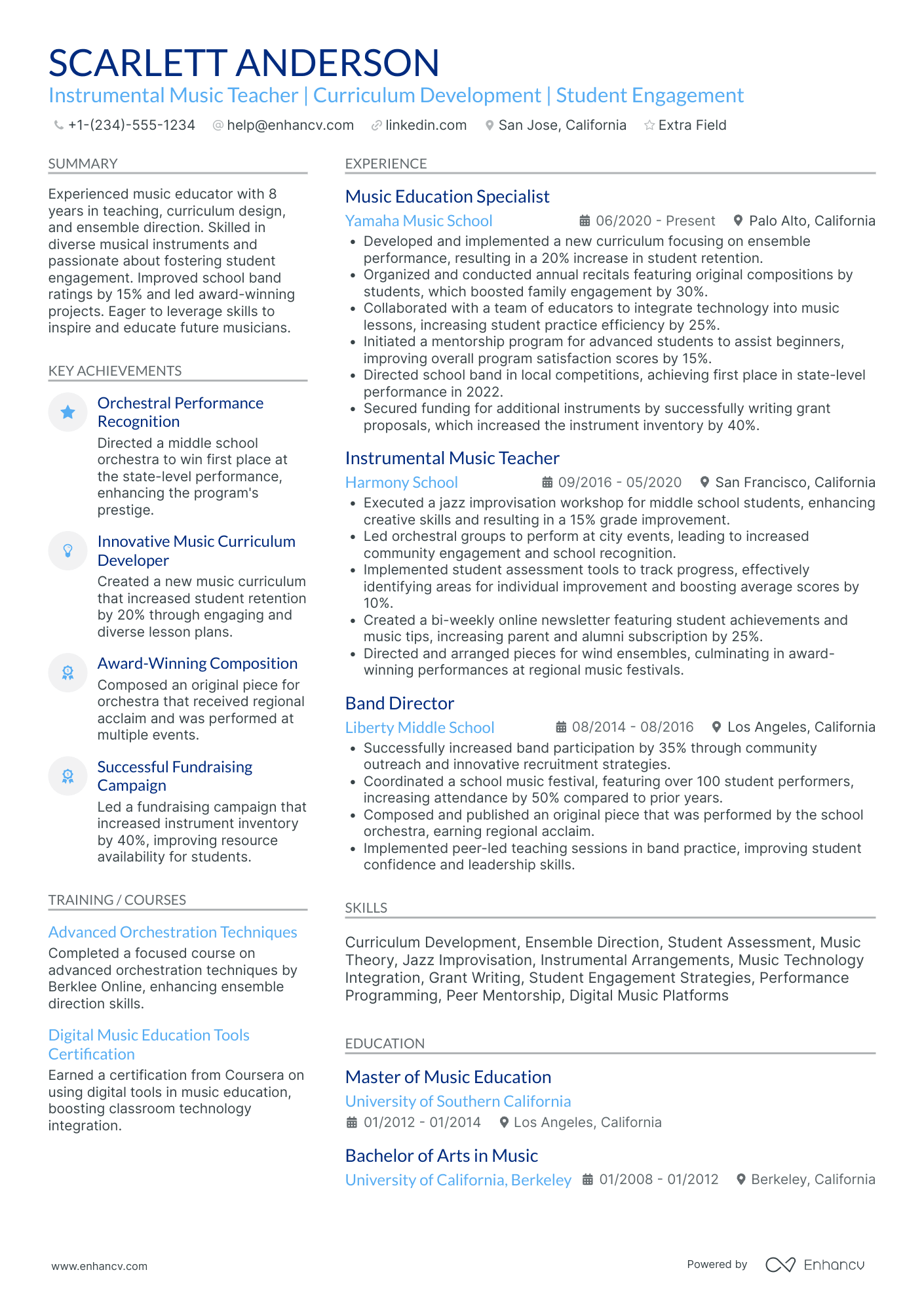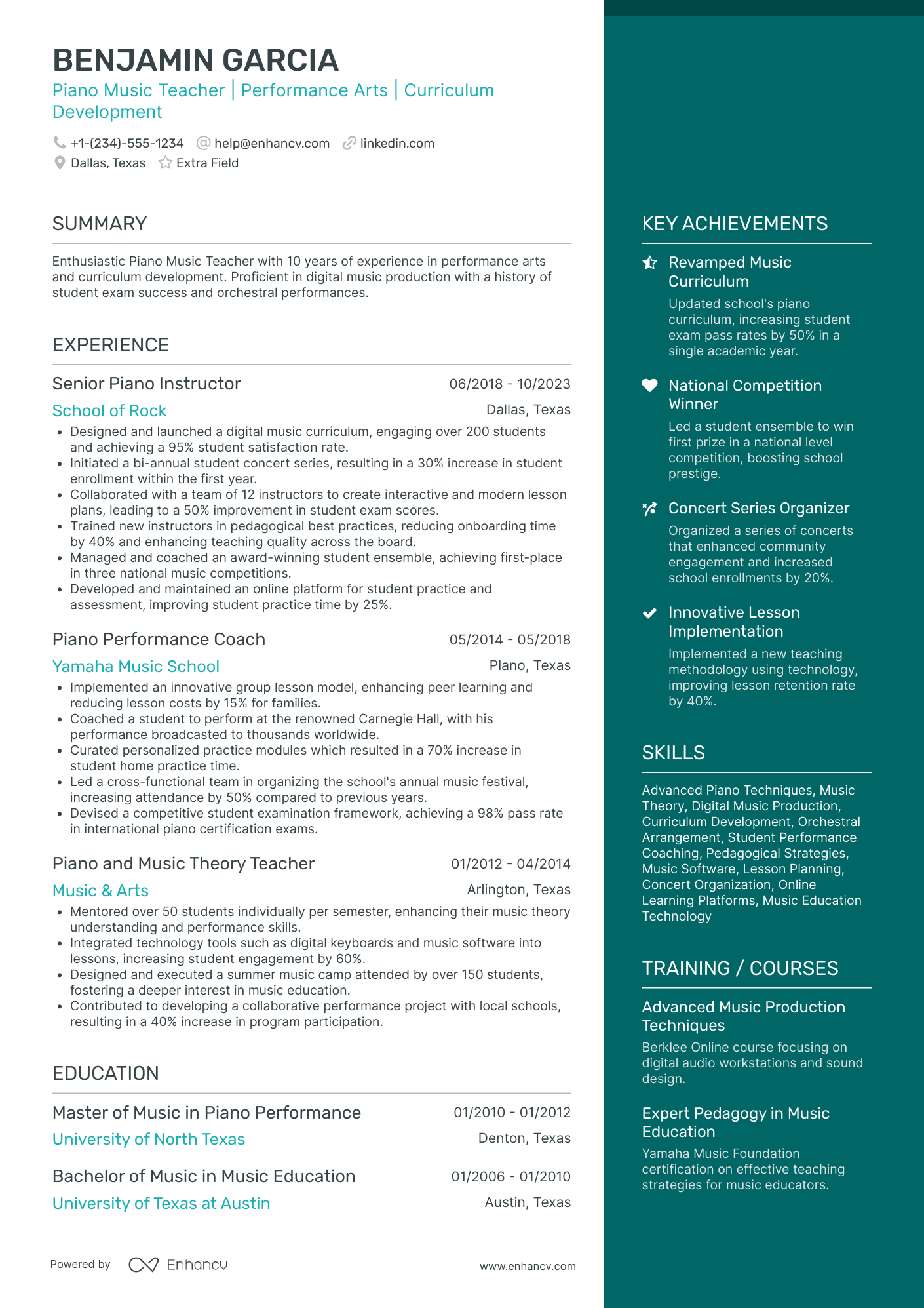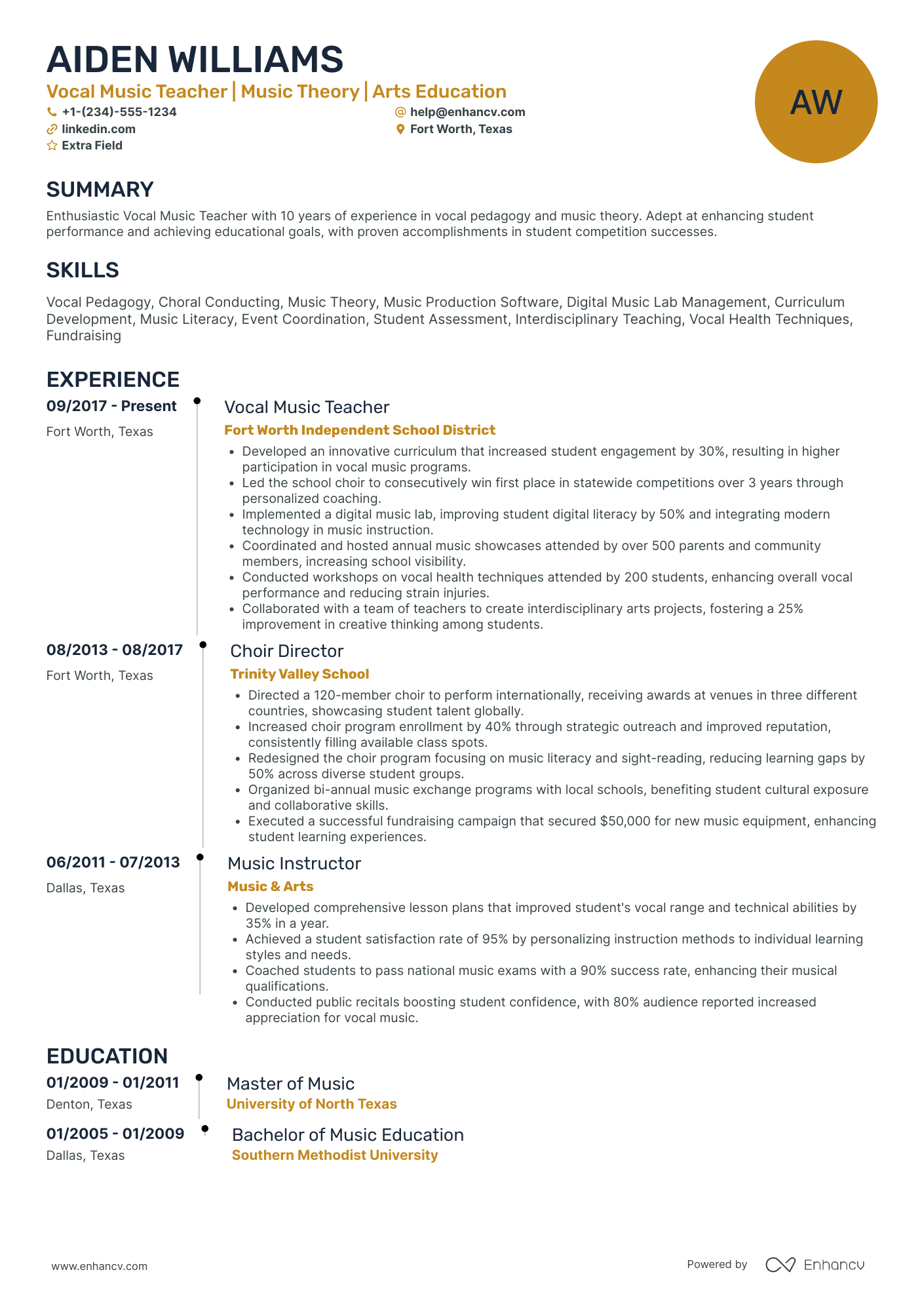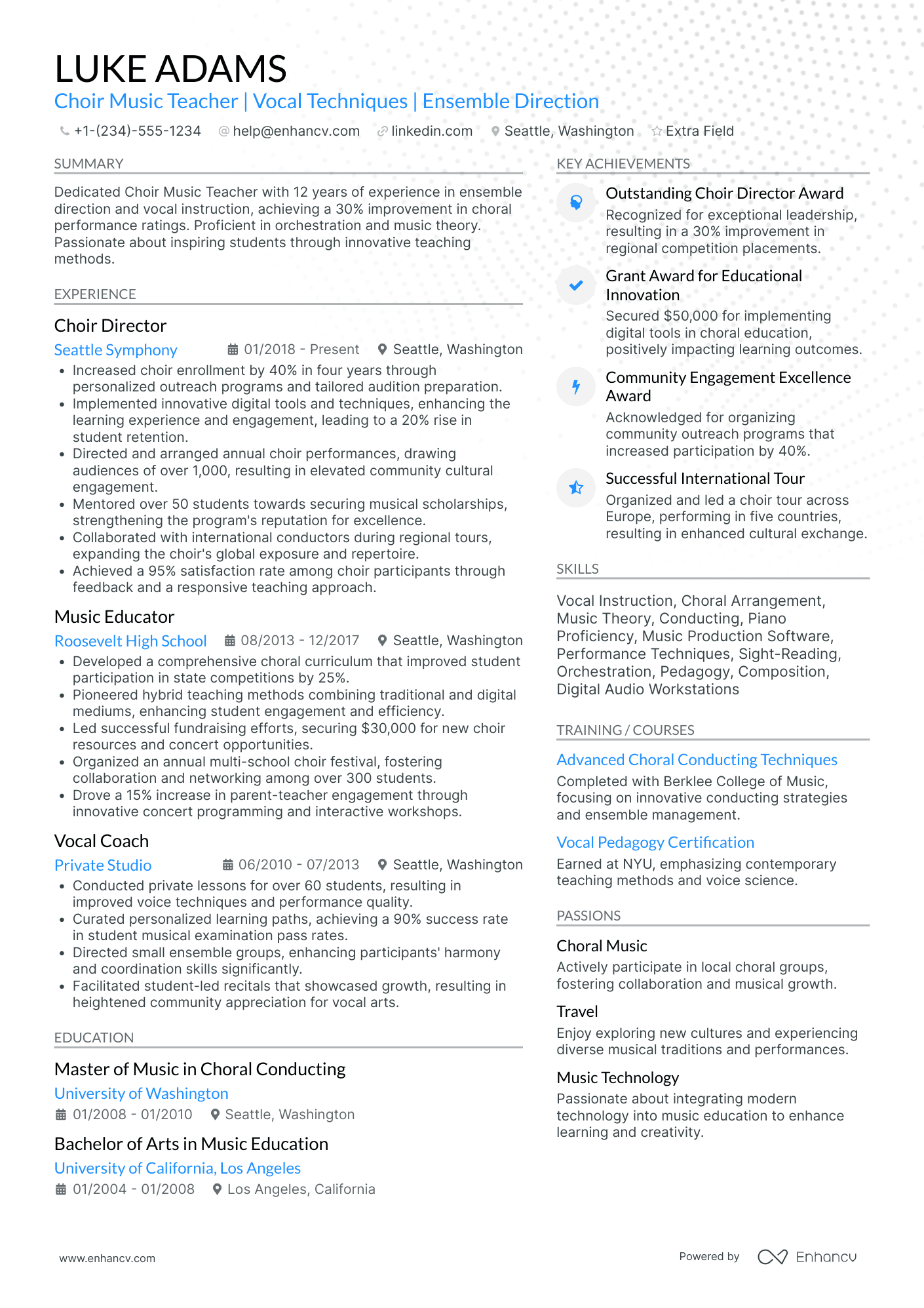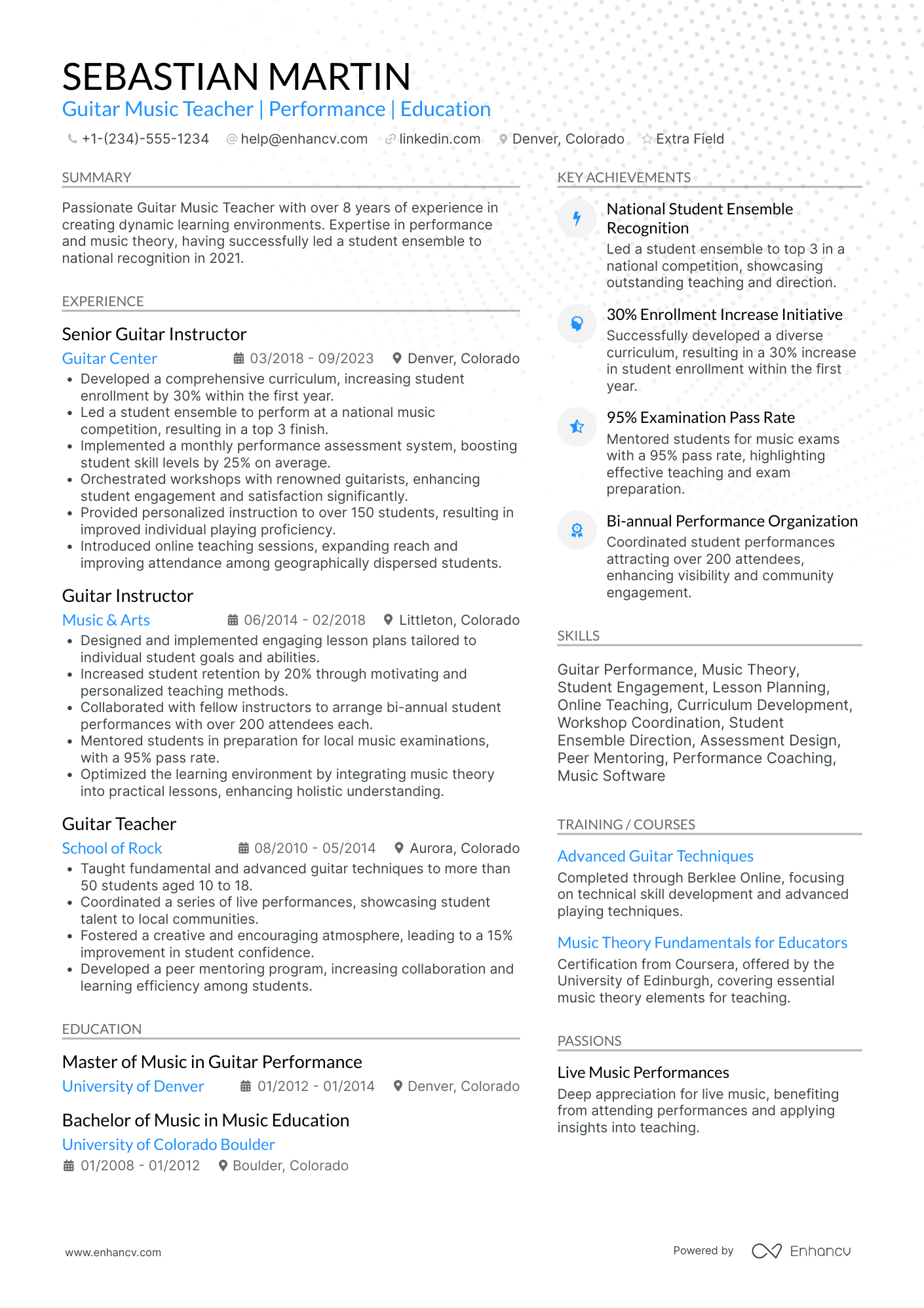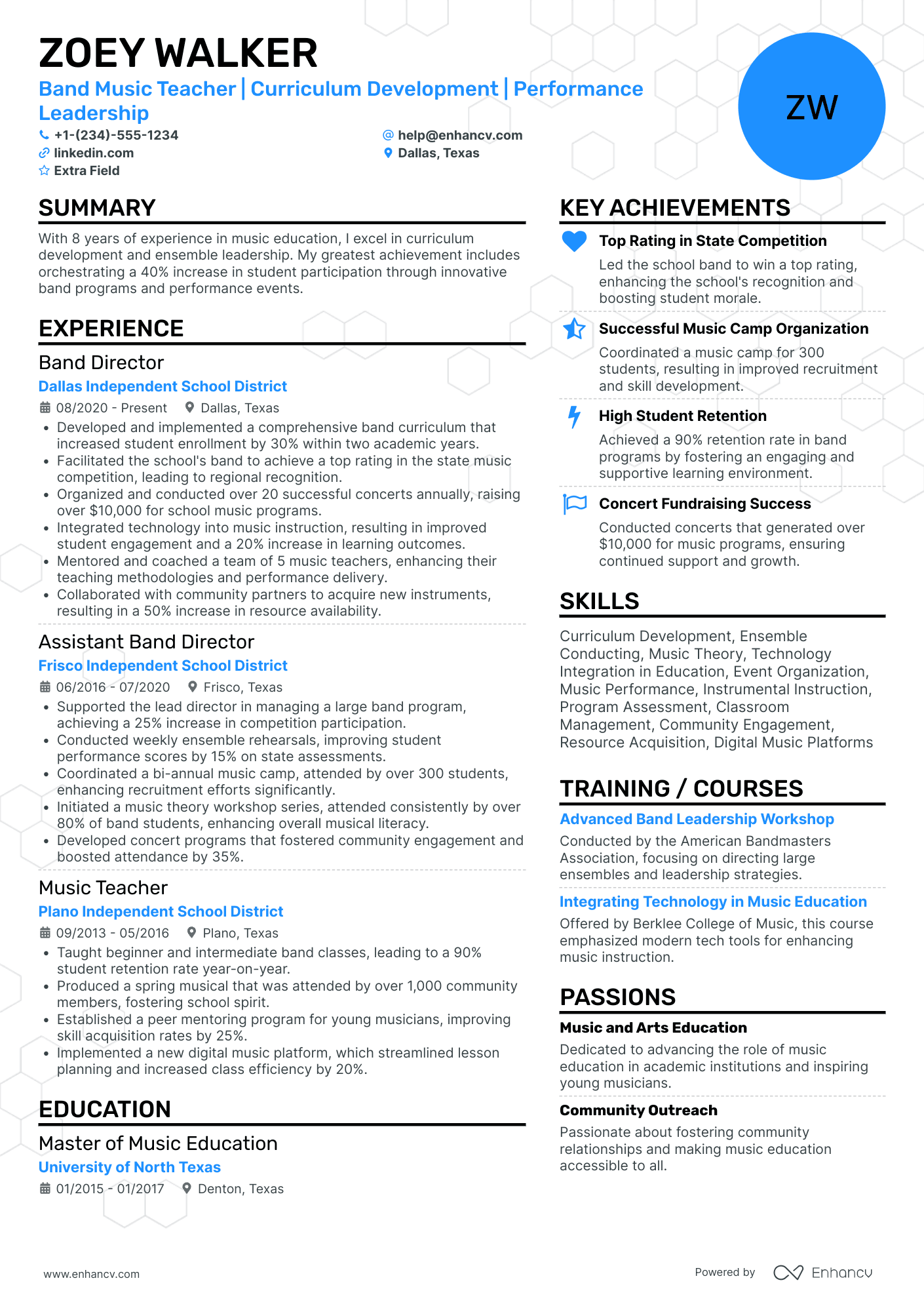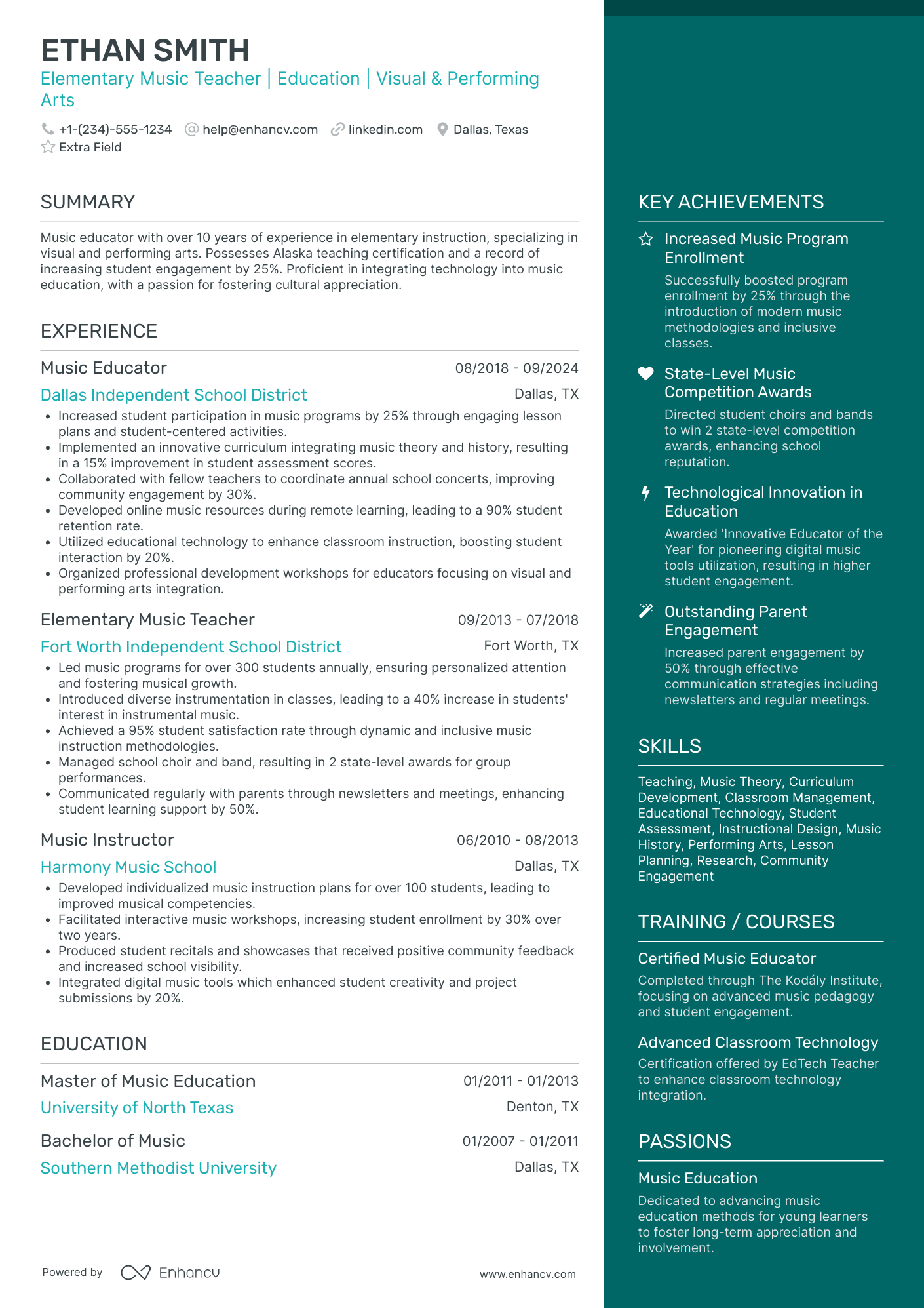As a music teacher, a significant resume challenge you may encounter is effectively translating your diverse experiences in teaching and performance into a cohesive narrative that resonates with school hiring committees. Our guide offers targeted strategies to articulate your unique skill set and accomplishments, ensuring your resume strikes a chord with potential employers.
- Which sections do you need to include in your resume to meet recruiters' requirements;
- How to write your music teacher resume experience section - even if you have don't have little to no work experience;
- Real-life professional examples to guide you how to write the most important music teacher resume sections;
- Adding even more sections so your music teacher resume stands out with professionalism and your personality.
We've also selected some of the best (and most relevant) resume guides for the music teacher role you're applying for:
How to style your music teacher resume: layout and format
When creating your music teacher resume, have you ever wondered how long it should be? Experts point out that it should be between one and two pages. Choose the longer format, if you happen to have over a decade of relevant experience. What is more, resume formats play a crucial role in presenting your experience. Use the:- Reverse-chronological resume format to highlight your experience;
- Functional skill-based resume format if you have less experience and want to focus on skills;
- Hybrid resume format to guide recruiters through both your experience and skills.
- Make sure your headline is simple and includes the job you're applying for or your current role, an abbreviation of a certificate you have, or even your professional area of interest;
- Always tailor your music teacher resume to the role you're applying for by matching job requirements to your experience via different resume sections;
- Once you've created your resume, download it in PDF (unless otherwise specified). This is to ensure readability and that the layout remains fixed.
Each market has its own resume standards – a Canadian resume layout may differ, for example.
Upload & Check Your Resume
Drop your resume here or choose a file. PDF & DOCX only. Max 2MB file size.
PRO TIP
Mention specific courses or projects that are pertinent to the job you're applying for.
Traditional sections, appreciated by recruiters, for your music teacher resume:
- Clear and concise header with relevant links and contact details
- Summary or objective with precise snapshot of our career highlights and why you're a suitable candidate for the music teacher role
- Experience that goes into the nuts and bolts of your professional qualifications and success
- Skills section(-s) for more in-depth talent-alignment between job keywords and your own profile
- Education and certifications sections to further show your commitment for growth in the specific niche
What recruiters want to see on your resume:
- Demonstrated expertise in the instrument or vocal category that the teacher specializes in, including formal education and performance experience.
- Successful track record of student engagement and the effective transformation of students' musical abilities and understanding.
- Knowledge of diverse music theories, teaching methodologies, and curriculum development tailored to various skill levels.
- Strong communication skills to convey complex concepts to students of all ages and to interact effectively with parents and school staff.
- Experience with planning, organizing, and leading musical performances and events like recitals, ensembles, and school concerts.
What to include in the experience section of your music teacher resume
The resume experience section is perhaps the most important element in your application as it needs to showcase how your current profile matches the job.
While it may take some time to perfect your music teacher experience section, here are five tips to keep in mind when writing yours:
- Assess the advert to make a list of key requirements and look back on how each of your past jobs answers those;
- Don't just showcase you know a particular skill, instead, you need proof in the form of tangible results (e.g. numbers, percent, etc.);
- It's perfectly fine to leave off experience items that don't bring anything extra to your skill set or application;
- Recruiters want to understand what the particular value is of working with you, so instead of solely featuring technologies, think about including at least one bullet that's focused on your soft skills;
- Take care with wording each bullet to demonstrate what you've achieved, using a particular skill, and an action verb.
The below music teacher resume examples can help guide you to curate your professional experience, following industry-leading tips and advice.
- Designed and delivered innovative curriculum for over 200 students across 5 different age groups, boosting overall student engagement by 40%.
- Implemented a differentiated instruction strategy that catered to various learning styles, increasing average student performance metrics by 20%.
- Spearheaded the annual school musical, overseeing a cast and crew of 50 students, and achieved a 95% sold-out run across all performances.
- Led a team of music instructors in the development of an online learning platform, attracting over 5,000 active users in its first year.
- Facilitated weekly masterclass workshops with renowned industry professionals, enhancing the school’s reputation and resulting in a 30% increase in enrollments.
- Cultivated relationships with local musicians and venues to create performance opportunities for advanced students, resulting in a 15% uptick in student retention.
- Developed a comprehensive music theory and instrument program that saw student pass rates for state music exams rise by 25%.
- Integrated technology by incorporating music production software tutorials into the curriculum, increasing student proficiency in digital composition.
- Managed the seasonal school orchestra, leading over 60 musicians and enhancing community engagement through public performances.
- Individualized lesson plans for a diverse classroom of 30 students, emphasizing personal musical growth and achieving a 90% satisfaction rate on student evaluations.
- Collaborated with the local symphony to arrange a student mentorship program, bolstering advanced students' readiness for professional auditions.
- Coordinated and executed biannual recitals showcasing students’ progress, increasing community engagement by 100% between first and last event.
- Launched a district-wide initiative to incorporate multicultural music education, enriching the curriculum and fostering an inclusive environment for 1,200 students.
- Pioneered a peer-to-peer tutoring program in music theory and practice, which led to a measurable improvement in student scores by an average of 15 points.
- Orchestrated a collaborative effort with local businesses to fund and equip a state-of-the-art music technology lab, increasing student access to modern recording equipment.
- Custom-designed an adaptable music curriculum that catered to both group and individual instruction in a variety of instruments for over 300 students each year.
- Piloted a successful after-school jazz band, obtaining accolades in regional competitions and boosting the school's extracurricular participation by 20%.
- Conducted annual professional development sessions for fellow educators on integrating music technology into classroom settings, leading to a district-wide adoption rate of 85%.
- Established a groundbreaking digital music production program, empowering students to compose and publish original pieces, with 20 being featured in local media outlets.
- Engaged regularly with parents and the wider school community through multimedia presentations, thereby bolstering support and funding for music education programs.
- Incorporated music therapy techniques into the special education program, observing a notable improvement in student well-being and social skills.
- Restructured the music curriculum to align with the latest National Core Arts Standards, pioneering a modern approach that improved overall student scores by 18%.
- Collaborated between departments to integrate music education into cross-curricular projects, cementing the arts as a crucial part of school culture.
- Negotiated with software providers to offer cutting-edge music composition tools for students, which fostered a creative and innovatory learning environment.
The following content includes information from "O*NET OnLine" by the U.S. Department of Labor, Employment and Training Administration (USDOL/ETA). Used under the CC BY 4.0 license. The data represents the top responsibilities present on the task lists for music teacher professionals.
Top Responsibilities for Music Teacher:
- Instruct students individually and in groups, using teaching methods such as lectures, discussions, and demonstrations.
- Establish and enforce rules for behavior and procedures for maintaining order among the students.
- Guide and counsel students with adjustment or academic problems or with special academic interests.
- Adapt teaching methods and instructional materials to meet students' varying needs and interests.
- Plan and conduct activities for a balanced program of instruction, demonstration, and work time that provides students with opportunities to observe, question, and investigate.
- Prepare materials and classrooms for class activities.
- Read books to entire classes or small groups.
- Observe and evaluate students' performance, behavior, social development, and physical health.
- Confer with parents or guardians, teachers, counselors, and administrators to resolve students' behavioral and academic problems.
- Meet with parents and guardians to discuss their children's progress and to determine priorities for their children and their resource needs.
Quantifying impact on your resume
- Include the number of years you have been teaching music to demonstrate your level of experience.
- List the number of students you teach per year to show the breadth of your impact.
- Mention the percentage increase in student enrollment for music classes to highlight your influence on program growth.
- Specify the number of music recitals or concerts organized, reflecting your event management skills.
- Detail the percentage of students who pass music examinations or achieve distinctions under your tutelage.
- State the number of different instruments you are proficient in teaching, showcasing your versatility.
- Indicate the number of teacher training workshops or seminars you've conducted to illustrate your leadership in the field.
- Quantify any fundraising amounts you've secured for music programs or events to demonstrate your ability to support resource growth.
Action verbs for your music teacher resume
What to do if you don't have any experience
It's quite often that candidates without relevant work experience apply for a more entry-level role - and they end up getting hired.
Candidate resumes without experience have these four elements in common:
- Instead of listing their experience in reverse-chronological format (starting with the latest), they've selected a functional-skill-based format. In that way, music teacher resumes become more focused on strengths and skills
- Transferrable skills - or ones obtained thanks to work and life experience - have become the core of the resume
- Within the objective, you'd find career achievements, the reason behind the application, and the unique value the candidate brings about to the specific role
- Candidate skills are selected to cover basic requirements, but also show any niche expertise.
Recommended reads:
PRO TIP
The more time and effort you've put into obtaining the relevant certificate, the closer to the top it should be listed. This is especially important for more senior roles and if the company you're applying for is more forward-facing.
Featuring your hard skills and soft skills on your music teacher resume
The skills section of your music teacher resume needs to your various capabilities that align with the job requirements. List hard skills (or technical skills) to showcase to potential employers that you're perfectly apt at dealing with technological innovations and niche software. Meanwhile, your soft skills need to detail how you'd thrive within your new, potential environment with personal skills (e.g. resilience, negotiation, organization, etc.) Your music teacher resume skills section needs to include both types of skills to promote how you're both technical and cultural fit. Here's how to create your bespoke music teacher skills section to help you stand out:
- Focus on skill requirements that are listed toward the top of the job advert.
- Include niche skills that you've worked hard to obtain.
- Select specific soft skills that match the company (or the department) culture.
- Cover some of the basic job requirements by including important skills for the music teacher role - ones you haven't been able to list through the rest of your resume.
Get inspired with our music teacher sample skill list to list some of the most prominent hard and soft skills across the field.
Top skills for your music teacher resume:
Piano Proficiency
Guitar Proficiency
Music Theory
Notation Software (e.g., MuseScore, Sibelius)
Digital Audio Workstations (e.g., Ableton Live, GarageBand)
Conducting Techniques
Vocal Training Techniques
Music Composition
Music History
Sound Engineering
Communication
Patience
Creativity
Adaptability
Leadership
Empathy
Organization
Time Management
Conflict Resolution
Motivational Skills
Next, you will find information on the top technologies for music teacher professonals from "O*NET OnLine" by the U.S. Department of Labor, Employment and Training Administration (USDOL/ETA). Used under the CC BY 4.0 license.
Top technologies for Music Teacher’s resume:
- Email software
- Microsoft Outlook
- Padlet
- Schoology
- Nearpod
- Seesaw
PRO TIP
If you happen to have plenty of certificates, select the ones that are most applicable and sought-after across the industry. Organize them by relevance to the role you're applying for.
Certifications and education: in-demand sections for your music teacher resume
Your academic background in the form of certifications on your resume and your higher degree education is important to your application.
The certifications and education sections pinpoint a variety of hard and soft skills you possess, as well as your dedication to the industry.
Add relevant certificates to your music teacher resume by:
- Add special achievements or recognitions you've received during your education or certification, only if they're really noteworthy and/or applicable to the role
- Be concise - don't list every and any certificate you've obtained through your career, but instead, select the ones that would be most impressive to the role
- Include the name of the certificate or degree, institution, graduation dates, and certificate license numbers (if possible)
- Organize your education in reverse chronological format, starting with the latest degree you have that's most applicable for the role
Think of the education and certification sections as the further credibility your music teacher resume needs to pinpoint your success.
Now, if you're stuck on these resume sections, we've curated a list of the most popular technical certificates across the industry.
Have a look, below:
The top 5 certifications for your music teacher resume:
- Certified Music Educator (CME) - National Association for Music Education (NAfME)
- Music teachers National Association Professional Certification (MTNA) - music teachers National Association (MTNA)
- Registered music teacher (RMT) - Various State music teachers Associations
- Orff-Schulwerk Certification - American Orff-Schulwerk Association (AOSA)
- Kodály Certification - Organization of American Kodály Educators (OAKE)
The content below includes information from "O*NET OnLine" by the U.S. Department of Labor, Employment and Training Administration (USDOL/ETA). Used under the CC BY 4.0 license. The data represents the top associations for music teacher professionals.
Top US associations for a Music Teacher professional
- Alpha Delta Kappa International Honorary Organization for Women Educators
- American Federation of Teachers, AFL-CIO
- Childhood Education International
- Council for the Accreditation of Educator Preparation
- International Literacy Association
PRO TIP
Showcase any ongoing or recent educational efforts to stay updated in your field.
Recommended reads:
Deciding between a resume summary or objective for your music teacher role
Understanding the distinction between a resume summary and an objective is crucial for your music teacher resume.
A resume summary, typically three to five sentences long, offers a concise overview of your career. This is the place to showcase your most pertinent experience, key accomplishments, and skills. It's particularly well-suited for those with professional experience relevant to the job requirements.
In contrast, a resume objective focuses on how you can add value to potential employers. It addresses why they should hire you and outlines your career expectations and learning goals. Therefore, it's ideal for candidates with less experience.
In the following section of our guide, explore how resume summaries and objectives differ through some exemplary industry-specific examples.
Resume summaries for a music teacher job
- With over 10 years of experience instructing students in classical and contemporary music, I have developed a robust curriculum that emphasizes both theory and practice. I possess advanced skills in piano and violin, and my students have won numerous regional competitions, demonstrating my commitment to fostering musical excellence and passion.
- Seasoned professional from the performing arts sector with a track record of choreographing award-winning routines, seeking to transition into music education. Brings 12 years of experience in fostering creativity and delivers a unique blend of artistic vision and educational strategies to cultivate students' musical talents.
- As a former software engineer with a personal passion for music production and 8 years of experience in developing cutting-edge audio software, I am transitioning to music teaching. I aim to leverage my technical skills and dedication to music to inspire the next generation of digital music creators.
- Bringing a fresh perspective to music education, with a background in music journalism and 6 years of engaging audiences through multimedia storytelling. Combines a deep understanding of music history and genre analysis with innovative teaching techniques to make music education relevant and exciting for today's students.
- As a passionate advocate for music as a universal language, I am seeking to launch my career as a music teacher. I am eager to apply my recent Bachelor of Music degree, knowledge in a range of instruments, and objective to inspire young minds in the joys and disciplines of musical expression.
- Educational newcomer with a rich background in music dynamics and ensemble performance seeks to bring fresh enthusiasm to music teaching. Holding a Master’s degree in Music Therapy, committed to unlocking the therapeutic and educational potential of music for students of all ages and abilities.
Optimize your resume summary and objective for ATS
Drop your resume here or choose a file.
PDF & DOCX only. Max 2MB file size.
Average salary info by state in the US for music teacher professionals
Local salary info for Music Teacher.” Source: My Next Move, National Center for O*NET Development. Accessed 10/15/2024
| State | Average Salary (in USD) |
|---|---|
| US National Average | $63,680 |
| California (CA) | $96,700 |
| Texas (TX) | $63,670 |
| Florida (FL) | $56,850 |
| New York (NY) | $85,700 |
| Pennsylvania (PA) | $74,490 |
| Illinois (IL) | $64,900 |
| Ohio (OH) | $74,530 |
| Georgia (GA) | $64,390 |
| North Carolina (NC) | $50,200 |
| Michigan (MI) | $63,290 |
Taking your music teacher resume to the next level with these four additional resume sections
Your music teacher resume can feature a variety of skills (both hard and soft) in diverse sections. Choose those that align best with the job requirements and reflect your suitability for the company culture.
Consider these four additional resume sections recommended by our experts:
- Languages - State any languages you are proficient in and your level of proficiency. This demonstrates your commitment to communication and potential for international growth.
- Projects - Highlight up to three significant projects you've completed outside of work, showcasing skill development. Include a link to your project portfolio in the music teacher resume header, if applicable.
- My Time - How you allocate your time outside work can indicate your organizational skills and cultural fit within the company.
- Volunteering - Detail causes you're passionate about, roles you've held, and achievements in volunteering. Such experiences likely have honed a range of soft skills crucial for your dream job.
Key takeaways
- Ensure your music teacher resume uses a simple, easy-to-read format that reflects upon your experience and aligns with the role;
- Be specific within the top one-third of your resume (header and summary or objective) to pinpoint what makes you the ideal candidate for the music teacher role;
- Curate information that is tailored to the job by detailing skills, achievements, and actual outcomes of your efforts;
- List your certifications and technical capabilities to demonstrate your aptitude with specific software and technologies;
- The sections you decide on including on your music teacher should pinpoint your professional expertise and personality.
Music Teacher resume examples
By Experience
By Role
